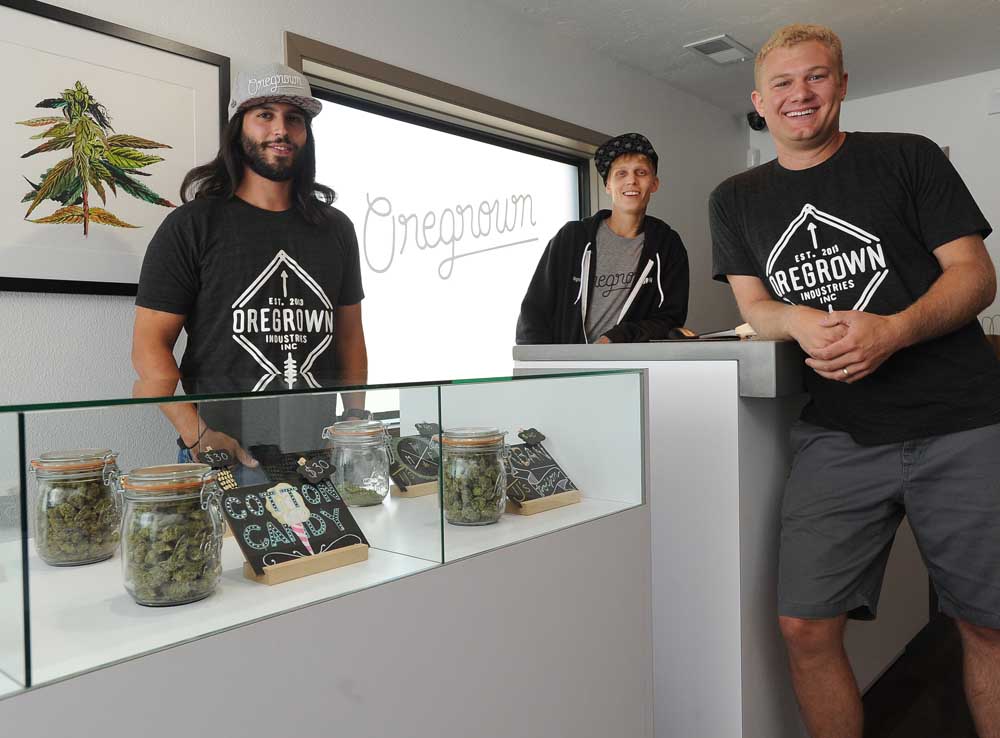Oregrown reveals crop failures in suit against grower
Published 12:00 am Friday, August 31, 2018

- From left, Aviv Hadar, Justin Crawn and Hunter Neubauer stand together in the Oregrown dispensary located on Wall Street in 2015. (Ryan Brennecke/Bulletin file photo)
The founders of Oregrown are trying to rein in a disgruntled former partner, who took marijuana plants and seeds from the company’s Tumalo growhouse, spread misinformation and tolerated anti-semitic harassment on Instagram, according to a lawsuit filed in Deschutes County Circuit Court.
Oregrown Industries Inc. filed suit this month against its former head grower, Justin Crawn. Although he contributed no cash to the company, Crawn, whom the suit says was a medical and black-market grower, was made a shareholder in Oregrown and Downtown Bend Flagship Inc., the entity that holds a license for recreational retail sales. Oregrown is seeking $2.7 million in damages, as well as an order stating Crawn is no longer a shareholder and an injunction and orders requiring Crawn to return control of Oregrown-affiliated Instagram accounts.
Crawn’s attorney, Cecil Gill, declined to discuss the suit in detail, but he said the theft allegations will be proven false. “You will see at some point in the near future a response and cross-complaint,” said Gill, who is based in Portland.
Contrary to the success projected by Oregrown’s extensive marketing and co-founder Hunter Neubauer’s involvement with the Bend Chamber of Commerce, the lawsuit describes Oregrown as a faltering business. And lays the blame with Crawn.
“Under Crawn’s leadership the cultivation operation never produced marketable flower with any sort of consistency,” the lawsuit states. “The founders were continually stifled by a lack of harvests as the company’s financial situation grew more and more dire.
“Many of the crops grown under Crawn’s care were complete losses in terms of producing shelf-worthy flower,” the suit states.
Oregrown was founded in 2014 by Neubauer, Aviv Hadar and Kevin Hogan, three high school buddies. Crawn had grown pot for Hadar under Oregon’s medical marijuana program, so they hired him to head up the commercial-scale operation, the suit states.
“There’s very few people that have done a 100-light grow successfully,” said Kelly Martin, CEO of Dakine 420, a Central Oregon company that makes fertilizer and potting soil.
Especially in the earliest days of legalization, marijuana investors had no choice but to rely on people whose experience was limited to garage-size operations, Martin said. “The people that had the money knew very little to nothing about the industry,” he said. “There’s a real under-supply of qualified master growers, if you will.”
Oregrown set Crawn up in March 2014 with a facility in Boring to grow for the Oregon medical program, the lawsuit states. “The Boring facility rarely produced crops that met industry standard parameters for yield and quality.”
Crawn insisted that the problem was the facility, and the lawsuit says Oregrown’s founders believed him.
Oregrown opened its Bend dispensary in January 2015 and a year and a half later acquired 84 acres in Tumalo for a new “world-class” cultivation facility, the suit says.
Like most medical marijuana dispensaries in Oregon, Oregrown obtained a license from the Oregon Liquor Control Commission, or OLCC, after recreational use became legal.
Once the OLCC licensed the Tumalo facility in January 2017, “Oregrown was ready to match its retail and branding success with a launch of its own flower line,” the lawsuit states.
Outwardly, Oregrown kept up the appearance of a vertically integrated cannabis company, despite apparent crop failures. In April 2017, the company issued a press release about a 4/20 event celebrating the first harvest from its Tumalo facility.
On the marijuana website Leafly, Oregrown boasts, “We are the only farm to table cannabis company in Oregon that controls every facet of its supply chain.”
Neubauer did not respond to a request for comment.
By late September 2017, the founders wanted to bring in a consultant, but Crawn refused help, the lawsuit states. The next four crops failed.
“By then, Oregrown could no longer make payroll, and the founders agreed to prioritize paying employees over paying the salaries of employee-shareholders,” the suit states. “For the 2017 year, Oregrown had a substantial net operating loss, caused almost entirely by Crawn’s failed cultivation operation and the resulting inability to take advantage of vertical integration.”
Oregrown brought in outside help in December 2017 and was able to produce marketable crops, the lawsuit states.
The founders met with Crawn on Jan. 11 to discuss a “potential exit.” He would get severance payments, and the company would redeem Crawn’s shares. According to the lawsuit, Crawn said he would think it over.
But later that same day, he returned to the growhouse and removed seeds and plants, all of which were tagged for Oregon’s cannabis tracking system, the suit states. The next morning, Crawn announced on Instagram that he’d decided to part ways with Oregrown. Then later that weekend, he and his nephew took more seeds, plants and grow lights, the suit states, and some of their actions were captured on security cameras, the suit states.
Crawn took 51 packs of seeds, at least one clone of all but one strain and all the plants with Oregrown’s “most proprietary” strains, Animal Mints and Mendo Breath, the lawsuit states. Crawn’s actions were reported to police and the OLCC, said Jon Stride, a partner at Tonkon Torp LLP representing Oregrown.
Oregrown alleges that Crawn is using its plants to grow for the black market, diluting the value of its product. The cannabis business also wants to gain control of the Instagram accounts where Crawn “unleashed a wave of vitriol and hatred” toward Oregrown and its founders, the lawsuit states.
Crawn attracted 120,000 Instagram followers under @oregrown024, but he was asked to change the handle to @justincrawn in summer 2017 after posting lewd images and making sexist remarks, the lawsuit states.
Within a few hours of Crawn announcing his separation from the company on Instagram, the comment thread included anti-semitic remarks such as, “when you’re partners with a Jew, it’s never going to end well.” Crawn liked a similar remark that named — and cursed — Oregrown co-founder Hadar, the lawsuit states.
Hadar is not a shareholder or director of the company but serves as its CEO, according to the suit.
Crawn has refused to remove anti-semitic comments and used Instagram to spread misinformation, the lawsuit states. He’s repeatedly asserted that Oregrown processed mildew-ridden pot into oil, the suit said.
Crawn still periodically disparages the company, the suit states. As recently as July, he posted, “What do you get when you cross a snake & a rat?? Answer- @avivhadar.” Social media harassment by Crawn’s affiliates has extended to Hadar’s wife and included a threat directed toward his children, according to the suit.
Stride stated in an email: “Oregrown does not tolerate hate of any kind, or anyone who endorses or directs racism, sexism, anti-Semitism or prejudice at Oregrown, its founders, employees, or anyone else.”
— Reporter: 541-617-7860, kmclaughlin@bendbulletin.com








